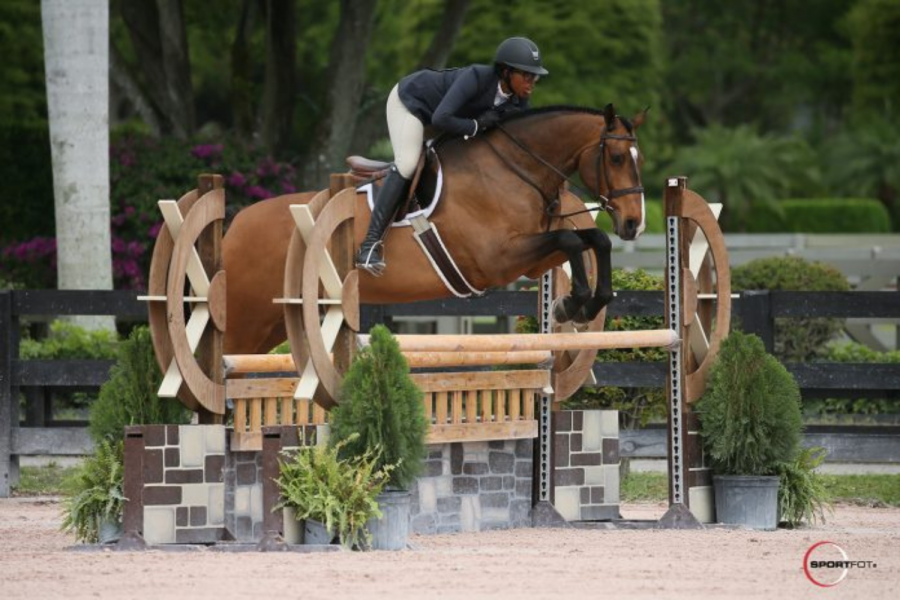Jordan Allen and her horse Chevito
Diversity in the Equestrian World
December 3, 2020
As I was reading in Heelsdown Magazine, I came across this sentence. “Horses come in all shades, so why not their riders?”
Horseback riding is one of the most well-known sports worldwide, with different disciplines, training, contestants, and horses. Each field is unique and varies in many various forms. As with western riding, it is considered a horse-riding style that evolved from the ranching and welfare traditions. Both equipment and riding style evolved to meet the functional needs of the cowboy in the American West.
Then there’s English, broken up into a few main disciplines such as Hunter/Jumper, Equitation, and Dressage. Hunter is a style in which the horse is considered on its performance and execution of a course. Jumpers are judged on the time it takes to complete the set of jumps and the performance.
Equitation, however, is mainly judged on the rider and the horse and execution of the course. Dressage is performed by the horse and rider while demonstrating flatwork (no-jumping involved) as if the horse is dancing while it moves.
Diversity is essential and overlooked, especially in equestrian sport. Diversity can be forgotten and not talked about or addressed in the industry.
This past October, there had been many big equitation finals and hunter finals where people worldwide came to compete for a chance to win the title of the next Medal/Hunter Final winner. Horseback riders internationally test their skills with their horse in the ring. There are the same types of people at these finals- the only ones who can afford to go, and very few people of color.
18-year-old Jordan Allen, based out of Wellington, Florida, changed the outlook for many people. She is the only African American to compete for the Gamecocks on their equestrian team. The equestrian sport is expensive, but she managed to pay for costly lessons and shows while working hard outside of school and showing it is possible. Allen has become a role model to people of all backgrounds, colors, and sizes and has demonstrated anyone can do what they set their minds to.
“I wish the sport were more diverse,” Allen stated in Heels Down Magazine. “I think it isn’t because it’s not accessible to everyone. It’s just so expensive, it’s so time-consuming, and getting to be less than 1 percent doing this. So, to me, it means a lot. I’m not just doing it for me; I’m doing it for so many people. Not even just African Americans, [but] so many different kids.” showing the true meaning behind the sport that is generally overlooked or not seen.
Following the magazine interview, Sophie Gochman, a horse trainer, and journalist said to “The Chronicle of the Horse” that she faced a lot of backlash from the public and employers she was working with.
“I think that lack of diversity is a systemic issue in the U.S., and I think that when we have discussions about it, it’s important not to get defensive. I think we’re all guilty of doing that, but to understand that we’ve done our research,” said Gochman. “We can still form intelligent opinions that are worthy of being heard.”
And the more people who recognize the fact, the more likely it is to change.
Horseback riding is a physically and mentally demanding sport; it requires you to use a lot of positive self-talk and stay in control and realize what is in and out of your control while living in the present. You are continually working; whether you are on horseback, cleaning your horse or tack, or just taking care of your surroundings, there isn’t much time to take a moment and reflect. And when you do, you begin to appreciate the diversity in the sport.
As the sport continues to work on diversity in and out of the ring, it is essential to realize how to make it a more inclusive and safe space for everyone to learn and have fun.


Nyron Graham • Mar 18, 2021 at 1:58 pm
So does that mean ? I’ll never make it as
a thoroughbred owner , and win the Kentucky Derby ? Thanks for the article.
Gwendolyn D Little • Mar 6, 2021 at 5:51 am
I appreciate this article. Congratulations young lady. I live in Georgia. Since a child growing up in Detroit and attending Veterinary Tech college (Assoc Sicence), I have always wanted horses. I am a 60 year old African American Woman, after a early self-retirement I started EveryThing Horses Inc. I work with inner-city-youths mostly black in hopes get the interested in Equestrian activities. Sadly in 2019 I attended the AQH competition as a spector @ Conner’s Horse Park. The way I was avoided, over looked when asking question, I might as well have had my pitchfork and other Mucking tool.